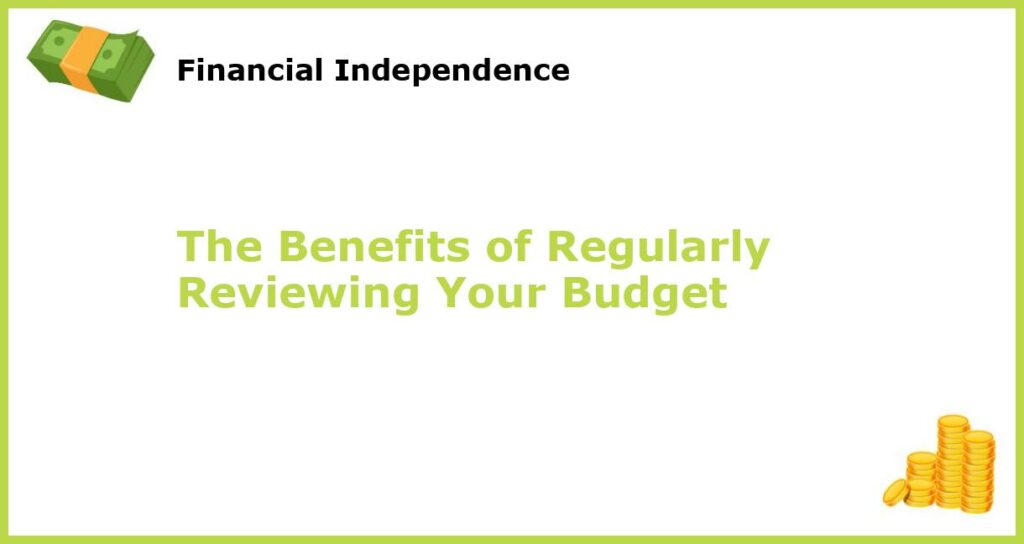Money makes the world go round, but it’s useless if you can’t manage it properly. One way to take control of your finances is through budgeting. However, creating a budget is just the first step; regularly reviewing it is key to achieving financial success. In this article, we’ll explore the benefits of regularly reviewing your budget.
1. Improved Financial Management

Managing your finances can be daunting, but by regularly reviewing your budget, you gain better insight into your expenses and income. You can identify areas where you may be overspending and make necessary adjustments to your budget. This will help you to manage your money better and avoid financial issues. Moreover, with a clear picture of your income and expenses, you’ll have vital information for any financial planning.
Reviewing your budget can also help you track your spending habits. You may notice that you’re spending too much on non-essential items, leading you to cut back to reduce your costs or redirect your funds towards your financial goals. This will make it easier to prioritize where you need to spend money and better manage your finances in the process.
Budgeting can also help you spot financial problems before they get out of control. Regularly reviewing your budget can help you notice patterns or changes that may indicate issues like overspending, missed payments or account inaccuracies. Addressing these issues early on will prevent them from snowballing into significant financial problems that can be harder to solve.
2. Better Decision-making

Regular budget review enables you to make informed decisions. You can easily evaluate changes in your expenditure and adjust your budget to align with your financial goals. This makes it easier to avoid financial decisions that don’t match your financial objectives. By evaluating your budget regularly, you can stay ahead of your financial game and make smarter decisions about your future expenses.
When you have multiple financial goals, a budget can help you prioritize them, so you know what to focus on first. It can also help you evaluate if those goals are realistic and if they can be achieved with your current financial situation. With this information, you can make necessary changes that will put you on the path towards financial success.
3. Reduced Stress

Financial stress can be overwhelming, but regularly reviewing your budget can help to alleviate some of it. When you have a clear picture of your finances, you’ll be able to plan accordingly, and reduce anxiety caused by uncertainty. Budgeting doesn’t just help you track your expenses, but it can also help you make informed decisions about when and how to spend money. This will create a sense of control that can ease your financial worries, letting you focus on the future more positively.
4. Increased Savings

When you review your budget regularly, you can identify areas where you can save money. You may find that you’re spending more than you need to on particular items or services, leading you to make lifestyle changes to redirect your funds into savings. Having a budget in place and regularly reviewing it, can help you establish and grow your saving habits, prepare for emergencies, or work towards your investing goals.
Regular budget review can also help you identify monthly wasteful expenses, like subscriptions or memberships, that you no longer use or can do without, which can add up over time. Portioning off funds to put into Tax-advantaged accounts or investment vehicles will also help your money grow more quickly.
5. Identifying Financial Problems Early

By regularly reviewing your budget, you can identify financial issues early on. This could include account inaccuracies, payment errors, overspending, or missed payments. If these issues are not addressed timely, they can snowball into more significant financial problems that can be harder to solve. The early identification of these issues will help you to solve them before they become too hard to handle or take corrective actions before the problems get any worse.
6. Improved Marriage and Family Relationships

Financial issues can cause stress and tension in relationships. By regularly reviewing the budget with your spouse or family, you can share financial goals, and identify and solve financial issues together. This promotes transparency, trust, and support in the family, preventing stress caused by financial disagreements.
Couples who budget together are also more likely to succeed because it allows them to communicate more effectively about money matters. Regular budget reviews can allow you to evaluate your progress and make any necessary tweaks that will maintain your financial stability and your relationship.
7. Helps Stick to Financial Goals

Regular budget review can help you to stay on track with your financial goals. You can assess your progress towards the goals and adjust your budget and lifestyle accordingly. This will help you to stay motivated and focused on achieving your goals. Budgeting helps prioritize your goals and keeps them visible, rather than letting them get lost in the shuffle of various short-term expenses.
By reviewing your budget regularly, you can see whether you are making progress towards your short-term and long-term financial goals. It can also help you adjust your budget to protect your overall financial objectives by making small tweaks that can get you back on track.
8. Highlights Changes in Income

Reviewing the budget regularly will allow you to recognise any changes in your income. A pay raise, bonus, or other financial inflows could mean you can adjust your budget to boost savings or investments. Reviewing your budget regularly with updated income information can help you to make informed decisions about where to allocate your funds.
If you’re self-employed or have irregular income, having a budget in place can help you manage your cashflows better. It can help you plan accordingly for when income is lower than usual, so you can avoid financial stress or delays.
9. Enables You to Plan for Big Expenses
Big expenses like house repairs, car insurance, or vacations, require careful planning. By regularly reviewing your budget, you can identify when these expenses are due, and how to save or adjust your finances to afford them. This prepares you mentally and financially, allowing you to avoid getting caught out unexpectedly by a significant expense.
Creating a plan for these significant expenses well in advance can also help alleviate stress and uncertainty connected to such expenses. You can establish a budget plan that sets aside a portion of your monthly budget over time to meet the expense’s sum. That way, you will not have to worry about how to pay all of it in one go once it arises.
10. Helps to Increase Financial Literacy
Regular budget review can help you to become financially literate. You may discover new ways to save money, manage your finances, or obtain new knowledge that can help you make better financial decisions. Researching and understanding tax knowledge, investing wisely, or understanding interest rates and other financial products offered by financial institutions can be daunting.
But a budget can simplify the process and help you stick to your goals. By understanding some simple financial concepts and having a foundation of sound financial planning, your financial literacy skills will get better over time. Your increased knowledge can lead to making better financial decisions and achieving more long-term financial security.







